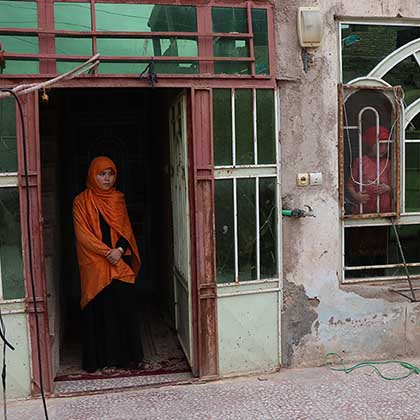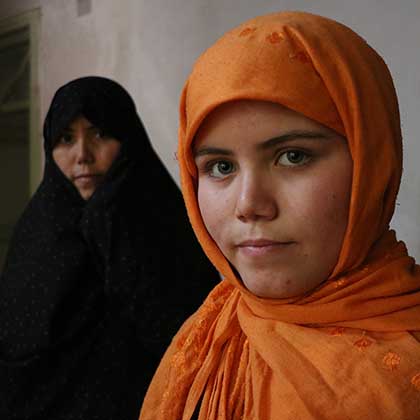Herat, Afghanistan Somaya was 13 and completing seventh grade when, as she says, “I lost my childhood.” Her father, Aminallah, accepted a 250,000 afghani ($3,300) payment in exchange for marrying her off to a relative’s son.
The girl begged her new husband and in-laws to allow her to return to school, “but they wouldn’t let me.” Instead, she says, they cursed and beat her. Finally, after months of struggle, she obtained a divorce. Now living with her mother and brother, Somaya has found comfort in their company and pride in her work as a seamstress.
Hers is a relatively happy outcome to early marriage, which, according to UNICEF, can impede the education, health and well-being of girls and the economic potential of their countries.
By the numbers

Afghanistan
| 35% | 9% |
| Married by 18 | Married by 15 |
| Regional comparison | Married by 18 |
|---|---|
| Bangladesh | 59% |
| Nepal | 40% |
| Afghanistan | 35% |
| India | 27% |
| Bhutan | 26% |
| Pakistan | 21% |
| Iran | 17% |
| Sri Lanka | 12% |
Select a country to explore how it compares to the region.
Afghanistan’s legal minimum age for marriage is 16. UNICEF defines any union with a partner younger than 18 as child marriage. In 2017, the Afghan central government launched an action plan against child marriage. Public education and economic empowerment play important roles in curbing the practice, says Dr. Sima Samar, who heads the Afghan Independent Human Rights Commission. She tells VOA in an email that if the AIHRC receives a complaint about child marriage, “then we can intervene” through authorities.
Meanwhile, research suggests Afghans’ support for early marriage is waning, even in relatively poor, rural areas such as Bamyan province, the Johns Hopkins Bloomberg School of Public Health reported last year. Researchers polled almost 1,000 12- to 15-year-olds and half as many parents in a handful of provinces. Three-fourths of those youths were still in school and unmarried. And though three-fourths of the parents never had formal education, “over 90% thought their children should complete secondary school. … About 40% of them said marriage should wait until after secondary school,” says the study’s senior author, Dr. Robert Blum.
“Attitude shift does not in and of itself mean behavior change,” he tells VOA. But, he adds, “This is really a sea change for a country in one generation.”
TRANSCRIPT:
My name is Somaya, and my father’s name is Aminallah.
I was studying in seventh grade. But 10 days before my final exam, I was married.
My in-laws did not let me go back to school.
I insisted I wanted to go to school. But my in-laws said, ‘If you went to school, who would do chores at home?’
They told me, ‘We bought you, and we won’t let you.’
Anytime I said I wanted to go to school, my in-laws and my husband would beat me and tell me, ‘You can’t go to school.’
My husband was young and immature, and his parents would encourage him to beat me and insult me. But I never complained to my father or anyone. I just lived with it.
My in-laws are illiterate, and they said, ‘If you go to school, who would do the chores?’
There were 15 people living in a small, shabby house.
My in-laws paid $3,300 (250,000 afghani) as dowry to my family.
But in return, God as my witness, my father spent almost $4,000 (300,000 afghani) on items for their home.
He bought me gold jewelry, bedding and clothing.
My in-laws kicked, hit and slapped me, but they never whipped me, because that would have left marks on my body.
They would hit, kick and slap me every moment, and they insulted and cursed at me.
I lost my childhood. I loved school and going to school.
But they wouldn’t let me.
I don’t care that my husband has remarried. I don’t want a divorce.
I am willing to go back and live with them if he can provide me with a separate space, clothing and other things so I have nothing less than them.

Somaya was a 13-year-old seventh-grader when her father sold her to an abusive relative for $3,300. (Photos by Khalil Noorzai for VOA News)
Somaya was a 13-year-old seventh-grader when her father sold her to an abusive relative for $3,300. (Photos by Khalil Noorzai for VOA News)

Divorced since February and back in Herat, Somaya, now 15, sews in the living room of her family's home.

After being pulled from school at 13, Somaya is learning to read the Quran and is considering becoming a tutor. Her mother stands behind her.
LEFT: Divorced since February and back in Herat, Somaya, now 15, sews in the living room of her family's home. RIGHT: After being pulled from school at 13, Somaya is learning to read the Quran and is considering becoming a tutor. Her mother stands behind her.

Eight months after her first interview with VOA, Somaya, 15, is happy and healing. Her father received a two-year jail sentence for forcing her into marriage.
Eight months later
My father went to jail four months ago after being sentenced to two years there. I am divorced now.
My husband and in-laws are living their lives, and I am living mine.
I sew clothing with my mother, and my brother works in a factory.
We are the breadwinners now. My father never worked.
My life is better, especially now that my father is not here.
My father used to fight with us and take the money we’d earned by sewing.
I had a lot of problems in the past.
We pay our expenses with the money we earn by sewing.
Each dress may cost 100 to 300 rupees.
Our street has five to six tailors, but because we are poor and we don’t charge a lot, we have many customers.
At the moment, I haven’t decided whether to go back to school.
I’m getting tutored in reading the Quran.
I plan to tutor students myself once I finish.
Global perspective
| 10% | 20% | 30% | 40% | 50% | 60% |
